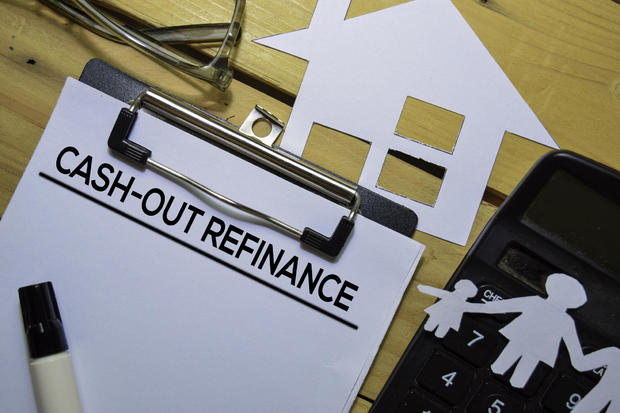Cash-out refinancing: What you need to know
If you need cash for home repairs, medical bills or to pay off debts, a cash-out refinance could help. This type of refinance allows you to tap your home equity and turn it into cash, which you can then use for virtually any purpose.
Cash-out refinances aren't right for everyone, though. Here's what you need to know if you're considering one.
What is a cash-out refinance?
A cash-out refinance is just how it sounds: A mortgage refinance that lets you take cash out of your home.
A mortgage refinance may be a good idea if you're planning to stay in your home for the next several years. If you're looking to take cash out, fill out this quick survey to determine your next steps and potential future savings.
Here's how it works:
- Take out a new mortgage loan in a larger amount than your existing mortgage.
- Use the new loan to pay off your old one, essentially replacing it.
- After closing, you get the difference between those numbers (your old mortgage balance and your new one) in cash.
You can then use those funds for whatever expense you might be facing. Some homeowners use these to pay off high-interest debts. Mortgage loans tend to have lower interest rates than credit cards and other financial products (like personal loans), so this strategy can help save on long-term interest.
Before you refinance your mortgage, it's a good idea to see what kind of interest rates you qualify for based on your financial situation.
How much cash can you get?
Most mortgage lenders let you take out up to 80% of your home's value. So if your home is worth $500,000, you could potentially take out up to $400,000.
Remember part of that has to go toward paying off your old balance. So, to calculate the maximum amount of cash you can take out, you'll need to subtract your existing mortgage balance first.
If you had a current balance of $225,000, for example, you'd be able to get up to $175,000 in that above scenario ($400,000 - $225,000).
Is a cash-out refinance a good idea?
The big advantage of cash-out refinancing is that you can access a lot of cash – and use those funds for any purpose. They also come with lower interest rates than most other financial products, and they have long terms, too, which means you won't need to pay the money back (at least in full) for quite some time.
Finally, if you itemize your returns, the interest paid on mortgage loans is tax-deductible. This can reduce your taxable income and, subsequently, the annual taxes you owe.
However, your monthly payment might increase. You'll also owe closing costs, which, according to Freddie Mac, cost around $5,000 on average. On top of this, you'll need to replace your current mortgage loan with a new one, which could mean a higher mortgage rate or a longer payoff timeline.
There's some risk to think about. If you take too much cash out and your home value falls, you could end up owing more than the home is worth. Additionally, if you can't make your new payment, you could be at risk of foreclosure.
Pros of cash-out refinancing
- Potentially large loan amounts
- Long payoff terms
- Can use the funds for any purpose
- Lower interest rates than other financial products
- Interest is tax-deductible
Cons of cash-out refinancing
- Requires closing costs
- Replaces current mortgage terms, which could mean a higher rate or longer payoff timeline
- It may mean a higher payment
- Increases your risk of foreclosure
When to use a cash-out refinance
The right time to use a cash-out refinance depends on your personal situation, current mortgage and goals for the extra money.
A cash-out refinance might be smart if:
- You have the funds to comfortably cover a higher monthly payment.
- You need to pay off high-interest debts like credit cards.
- You're facing expenses you'd otherwise need to put on a credit card or other high-interest product.
- You need to repair your home or make improvements.
A cash-out refinance might not be smart if:
- You're tight on funds.
- Refinancing your loan would mean losing a super-low interest rate.
- Home values are falling in your area, as this could leave you upside down on your mortgage (owing more than it's worth).
HELOC vs. cash-out refinance
Cash-out refinancing isn't your only option if you want to leverage your home's equity. You can also use a home equity loan or home equity line of credit (HELOC).
These are both types of second mortgages that you pay in addition to your existing mortgage payment. With a home equity loan, you get a lump sum payment. HELOCs work more like credit cards. You can withdraw from them as needed over an extended period of time.
You could also sell your house. If you're considering this, talk to a local real estate agent. They can help you gauge what your home might sell for, given current market conditions.
Consider a reverse mortgage, too
For certain homeowners, a reverse mortgage may also be beneficial and worth considering. A reverse mortgage allows older homeowners (62 and above) who have paid all or most of their home loan to then take out a portion of their home's equity. This is considered tax-free income (although it needs to be paid back if the homeowner dies or chooses to sell the home). The benefits of a reverse mortgage are multiple and, depending on your personal financial situation, may be more optimal than cash-out refinancing or a HELOC.
If you think you would benefit from a reverse mortgage, act today and learn more.




